Choosing the right bathroom countertop is essential for both functionality and aesthetics. The countertop is a significant part of the bathroom, providing a surface for daily activities such as grooming and storing toiletries while also contributing to the overall design and ambiance. There are various types of bathroom countertops available, each with its own set of advantages, drawbacks, and unique features, making it essential to select one that best suits your needs and preferences.
One of the most popular choices for bathroom countertops is granite. Granite is a natural stone known for its durability, heat resistance, and unique, natural patterns. Each slab of granite is different, offering a one-of-a-kind appearance that can enhance the elegance of any bathroom. Granite countertops are available in a wide range of colors, from light to dark hues, allowing homeowners to match them with their existing bathroom decor. However, granite does require regular sealing to maintain its resistance to stains and moisture.
Another widely favored option is quartz. Quartz countertops are engineered stone surfaces made from natural quartz combined with resins and pigments. This manufacturing process results in a non-porous, highly durable, and low-maintenance surface that resists stains, scratches, and bacteria. Quartz countertops come in a vast array of colors and patterns, including designs that mimic natural stones like marble and granite. Their uniform appearance and minimal upkeep make quartz a practical and stylish choice for modern bathrooms.
Marble countertops are synonymous with luxury and timeless beauty. This natural stone features elegant veining patterns that add a sophisticated touch to any bathroom. Marble is available in various shades, including white, gray, and black, each with distinct veining that makes it a popular choice for high-end bathroom designs. However, marble is more porous and softer than granite and quartz, making it susceptible to scratches, stains, and etching from acidic substances. Regular sealing and careful maintenance are necessary to preserve its appearance and durability.

Solid surface countertops, such as Corian, offer a seamless and versatile option for bathrooms. Made from a blend of acrylic and polyester resins, solid surface countertops can be molded into various shapes and sizes, allowing for integrated sinks and backsplashes. They are available in a wide range of colors and patterns, including those that resemble natural stone. Solid surface countertops are non-porous, making them resistant to stains and bacteria. Minor scratches and damage can be easily repaired by sanding and polishing the surface, making them a durable and low-maintenance choice.
Laminate countertops are an affordable and versatile option for bathroom countertops. Made from layers of paper or fabric impregnated with resin and bonded to a particleboard or MDF core, laminate countertops come in a vast array of colors, patterns, and finishes. They can mimic the look of natural stone, wood, or other materials at a fraction of the cost. Laminate countertops are easy to install and maintain, but they are less durable than other options and can be prone to scratches, burns, and water damage if not properly cared for.
Concrete countertops have gained popularity in modern and industrial-style bathrooms for their unique, customizable appearance. Concrete countertops can be cast in various shapes and sizes, and they can be tinted, stained, or embedded with materials like glass or stone to create a personalized look. Concrete is highly durable and heat-resistant, but it is porous and requires regular sealing to prevent stains and water damage. Additionally, concrete countertops can develop hairline cracks over time, which can add to their rustic charm but may not be desirable for all homeowners.
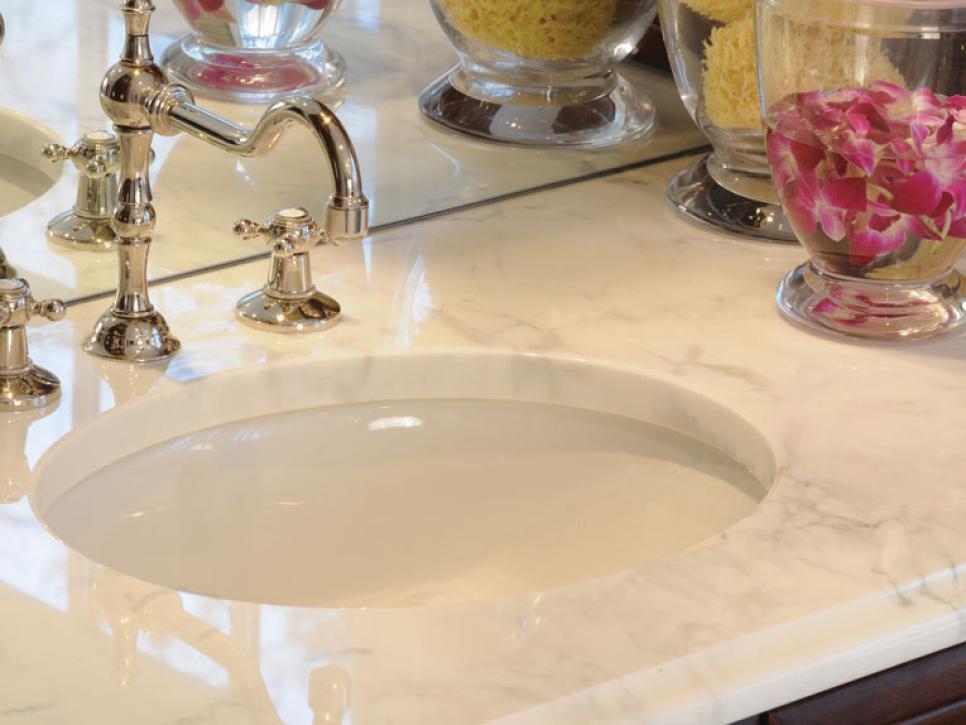
Tile countertops offer a classic and customizable option for bathrooms. Ceramic, porcelain, or natural stone tiles can be used to create a wide range of designs, from simple and understated to intricate and colorful patterns. Tile countertops are heat-resistant and durable, and individual tiles can be replaced if damaged. However, the grout lines between tiles can be prone to staining and require regular cleaning and sealing to maintain their appearance and hygiene.
Wood countertops, also known as butcher block countertops, bring warmth and natural beauty to the bathroom. Wood countertops can be made from various types of wood, including maple, oak, walnut, and teak, each with its unique grain patterns and colors. While wood countertops require regular sealing to protect against water damage and stains, they can develop a rich patina over time. They are susceptible to scratches and burns, but these can often be sanded out and refinished, making wood a resilient and charming choice.
Glass countertops offer a sleek and contemporary option for modern bathrooms. Made from tempered glass, these countertops are durable, non-porous, and resistant to stains and bacteria. Glass countertops can be clear, frosted, or colored, and they can incorporate features like embedded lighting or textured surfaces for added visual interest. However, glass countertops can show fingerprints and water spots, requiring regular cleaning to maintain their pristine appearance.
Stainless steel countertops are a popular choice for industrial and modern bathroom designs. Stainless steel is highly durable, heat-resistant, and non-porous, making it an excellent choice for bathrooms. It is also easy to clean and maintain, as it resists stains and bacteria. However, stainless steel can be prone to scratching and denting, and it can show fingerprints and water spots, requiring regular cleaning to keep it looking its best.
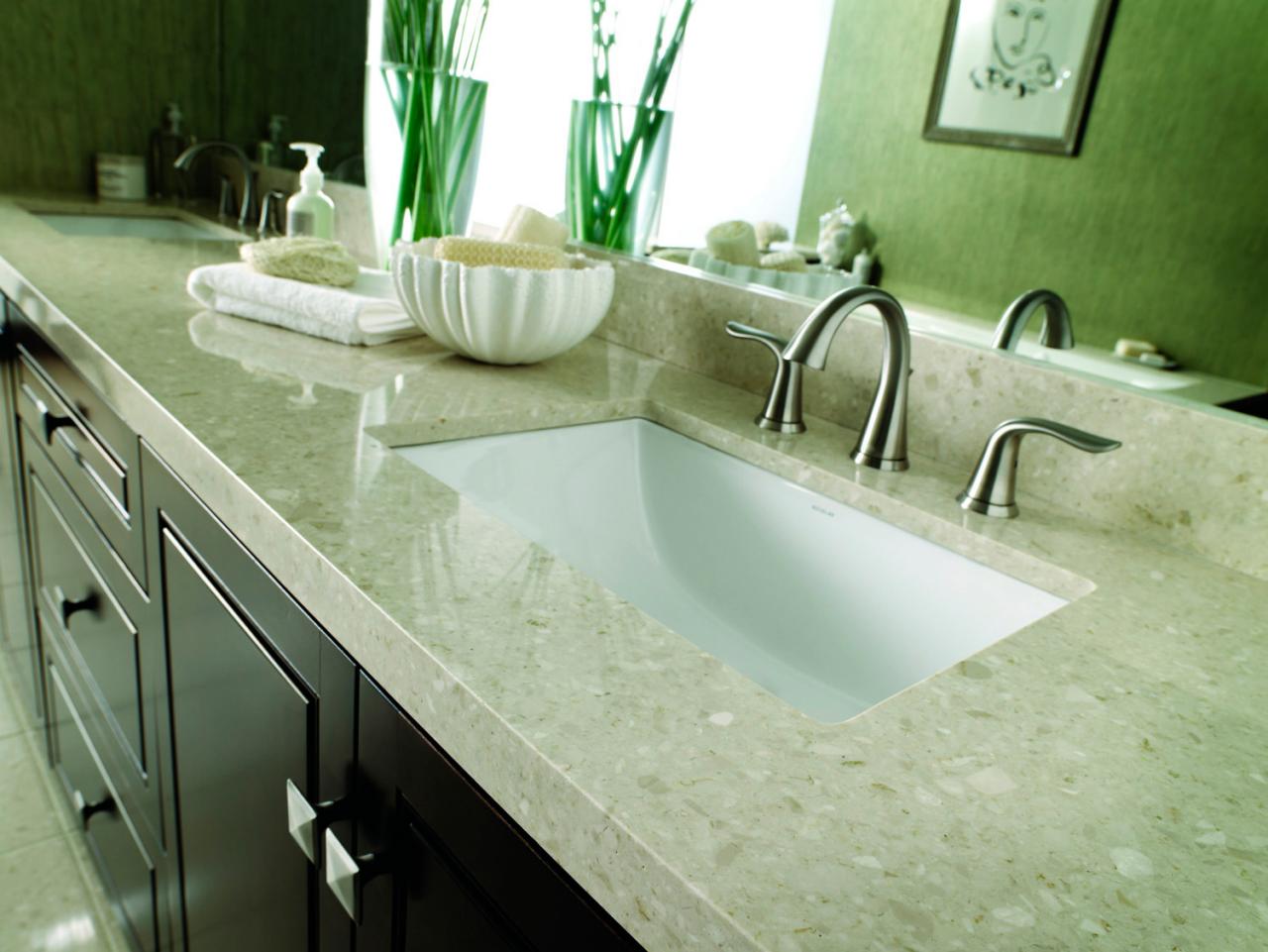
Recycled materials countertops, such as those made from recycled glass, paper, or composite materials, offer an eco-friendly option for bathroom countertops. These countertops are made from sustainable materials and often feature unique, eye-catching designs. Recycled glass countertops, for example, can incorporate colorful glass fragments set in a resin or concrete base, creating a striking and environmentally conscious choice. These countertops are durable and low-maintenance, making them a practical and sustainable option.
Soapstone countertops offer a unique, rustic charm with their smooth, matte surface and natural veining. Soapstone is a natural stone that is resistant to heat, stains, and bacteria, making it an excellent choice for bathrooms. It is also non-porous and does not require sealing, although it can develop a patina over time that adds to its character. Soapstone is softer than other natural stones and can be prone to scratches, but these can often be sanded out and refinished.
Onyx countertops provide a luxurious and translucent option for bathrooms. Onyx is a natural stone known for its striking patterns and vibrant colors. Its translucency allows it to be backlit, creating a dramatic and visually stunning effect. However, onyx is softer and more porous than other stones, making it susceptible to scratches, stains, and etching. Regular sealing and careful maintenance are necessary to preserve its beauty.
Quartzite countertops offer a natural stone option that combines the look of marble with the durability of granite. Quartzite is a metamorphic rock formed from sandstone and quartz under high heat and pressure, resulting in a hard and durable surface. It is available in various colors and patterns, often featuring veining and swirls similar to marble. Quartzite countertops are resistant to heat, scratches, and stains, making them a practical and elegant choice for bathrooms.
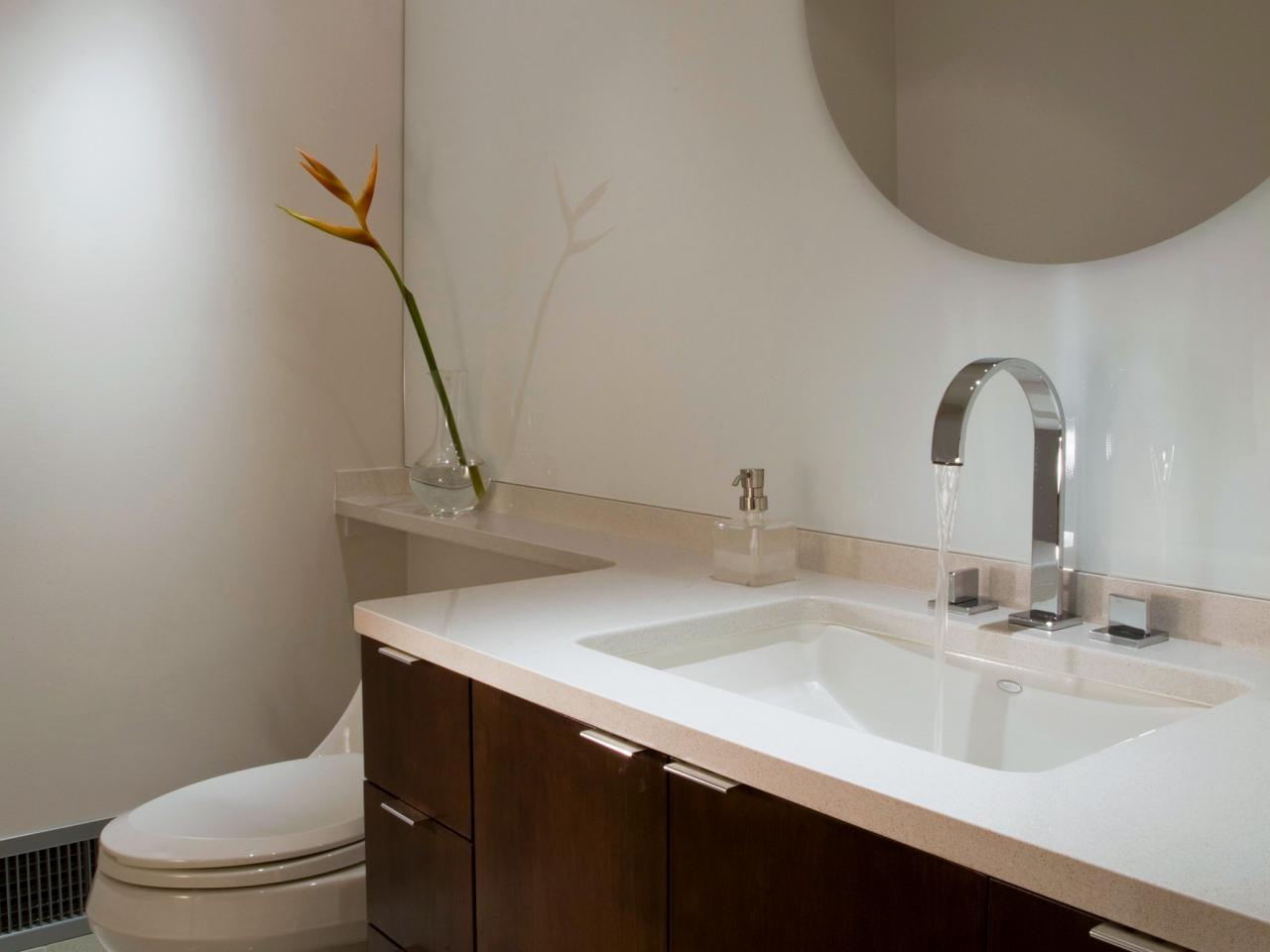
Common Mistakes to Avoid
One common mistake in selecting bathroom countertops is prioritizing aesthetics over functionality. While it’s important to choose a countertop that looks good, it must also be practical for the bathroom environment. For instance, opting for a beautiful but porous stone like marble without considering its maintenance needs can lead to dissatisfaction over time. Another mistake is neglecting to seal natural stone countertops. Regular sealing is essential to protect stones like granite and marble from stains and moisture damage.
Improper installation is another frequent issue. Even the highest quality countertop can fail if not installed correctly. Hiring experienced professionals to ensure proper installation can prevent problems such as uneven surfaces or poorly fitted edges. Additionally, ignoring the importance of durability can lead to problems. Choosing a countertop material that is not suited for the high-traffic and high-moisture environment of a bathroom can result in premature wear and damage.
Failing to consider the weight of certain countertop materials, such as granite or concrete, can also be a mistake. These heavy materials require sturdy cabinetry and proper support to prevent structural issues. Lastly, overlooking the maintenance requirements of different countertop materials can lead to long-term problems. Each material has specific cleaning and upkeep needs, and not following these guidelines can reduce the lifespan and appearance of the countertop.
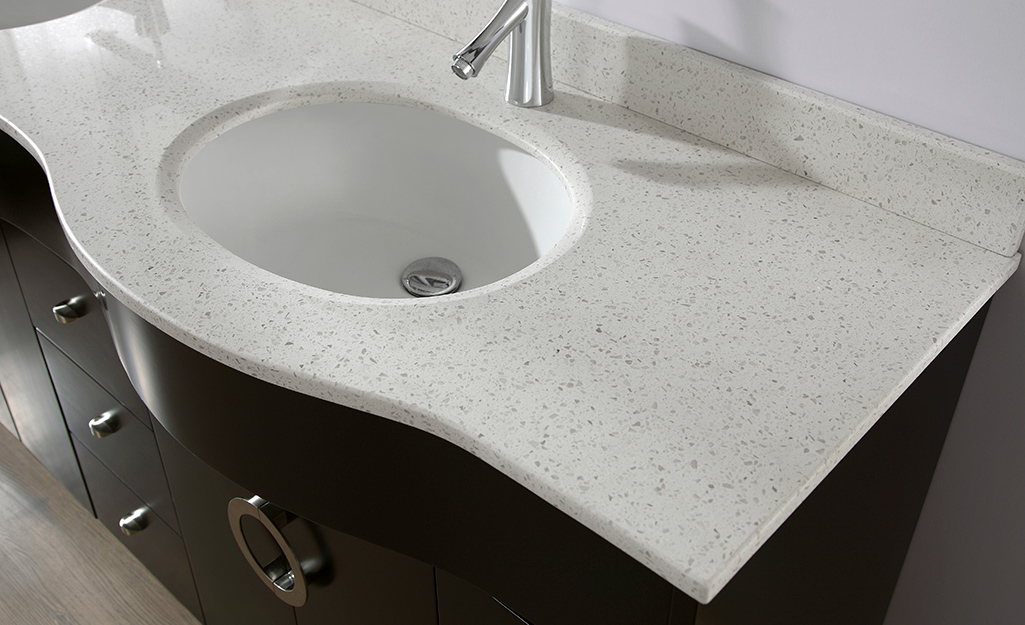
What are the benefits of choosing quartz countertops for a bathroom?
Quartz countertops offer numerous benefits for bathroom applications. They are engineered stone surfaces made from natural quartz combined with resins and pigments, resulting in a non-porous, highly durable, and low-maintenance surface. Quartz countertops resist stains, scratches, and bacteria, making them ideal for the bathroom environment. They come in a wide range of colors and patterns, including designs that mimic natural stones like marble and granite. The uniform appearance and minimal upkeep of quartz make it a practical and stylish choice for modern bathrooms.
How does granite compare to other natural stone countertops for bathrooms?
Granite is a popular natural stone choice for bathroom countertops due to its durability, heat resistance, and unique, natural patterns. Each slab of granite is different, offering a one-of-a-kind appearance that can enhance the elegance of any bathroom. Granite countertops are available in various colors, allowing homeowners to match them with their existing decor. However, granite requires regular sealing to maintain its resistance to stains and moisture, which can be more demanding than other materials like quartz or solid surface countertops.
What are the advantages of solid surface countertops in a bathroom?
Solid surface countertops, such as Corian, offer a seamless and versatile option for bathrooms. Made from a blend of acrylic and polyester resins, these countertops can be molded into various shapes and sizes, allowing for integrated sinks and backsplashes. They are non-porous, making them resistant to stains and bacteria, and are available in a wide range of colors and patterns. Minor scratches and damage can be easily repaired by sanding and polishing the surface, making solid surface countertops a durable and low-maintenance choice.
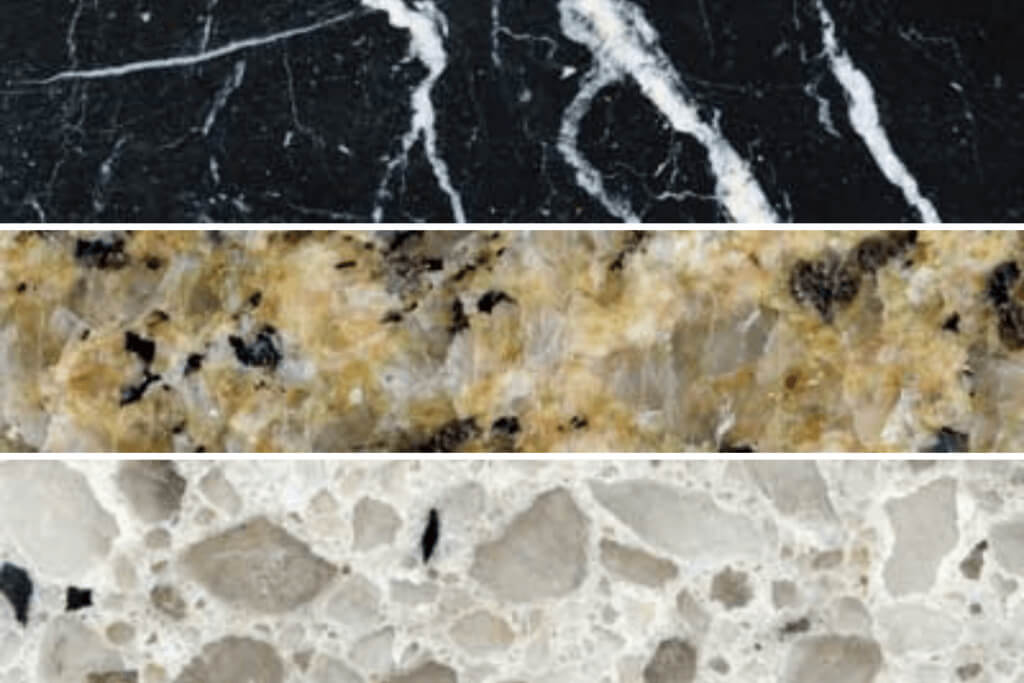
Why might someone choose a laminate countertop for their bathroom?
Laminate countertops are an affordable and versatile option for bathroom countertops. They are made from layers of paper or fabric impregnated with resin and bonded to a particleboard or MDF core. Laminate countertops come in a vast array of colors, patterns, and finishes, and can mimic the look of natural stone, wood, or other materials at a fraction of the cost. They are easy to install and maintain, but are less durable than other options and can be prone to scratches, burns, and water damage if not properly cared for.
How do concrete countertops fit into modern bathroom design?
Concrete countertops have gained popularity in modern and industrial-style bathrooms for their unique, customizable appearance. They can be cast in various shapes and sizes, and tinted, stained, or embedded with materials like glass or stone to create a personalized look. Concrete is highly durable and heat-resistant, but is porous and requires regular sealing to prevent stains and water damage. While concrete countertops can develop hairline cracks over time, these can add to their rustic charm and are part of the appeal for some homeowners.
What are the considerations for maintaining wood countertops in a bathroom?
Wood countertops, also known as butcher block countertops, bring warmth and natural beauty to the bathroom. They require regular sealing to protect against water damage and stains, as wood is naturally porous. Over time, wood countertops can develop a rich patina, adding to their charm. While they are susceptible to scratches and burns, these can often be sanded out and refinished. Regular maintenance is essential to preserve their appearance and durability, making them a resilient and aesthetically pleasing choice for bathrooms.

Bathroom Countertops 101: The Top Surface Materials
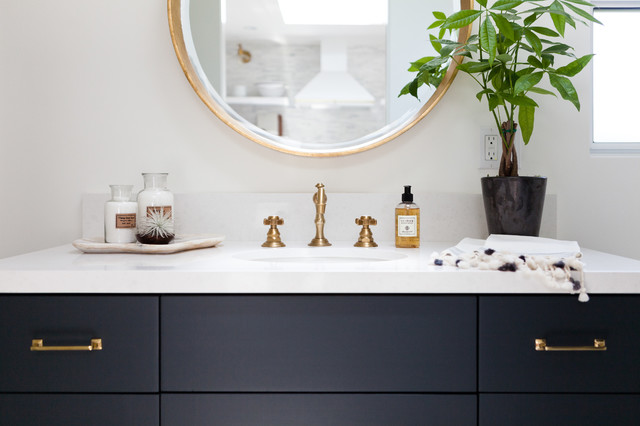
Bathroom Countertop Material Options
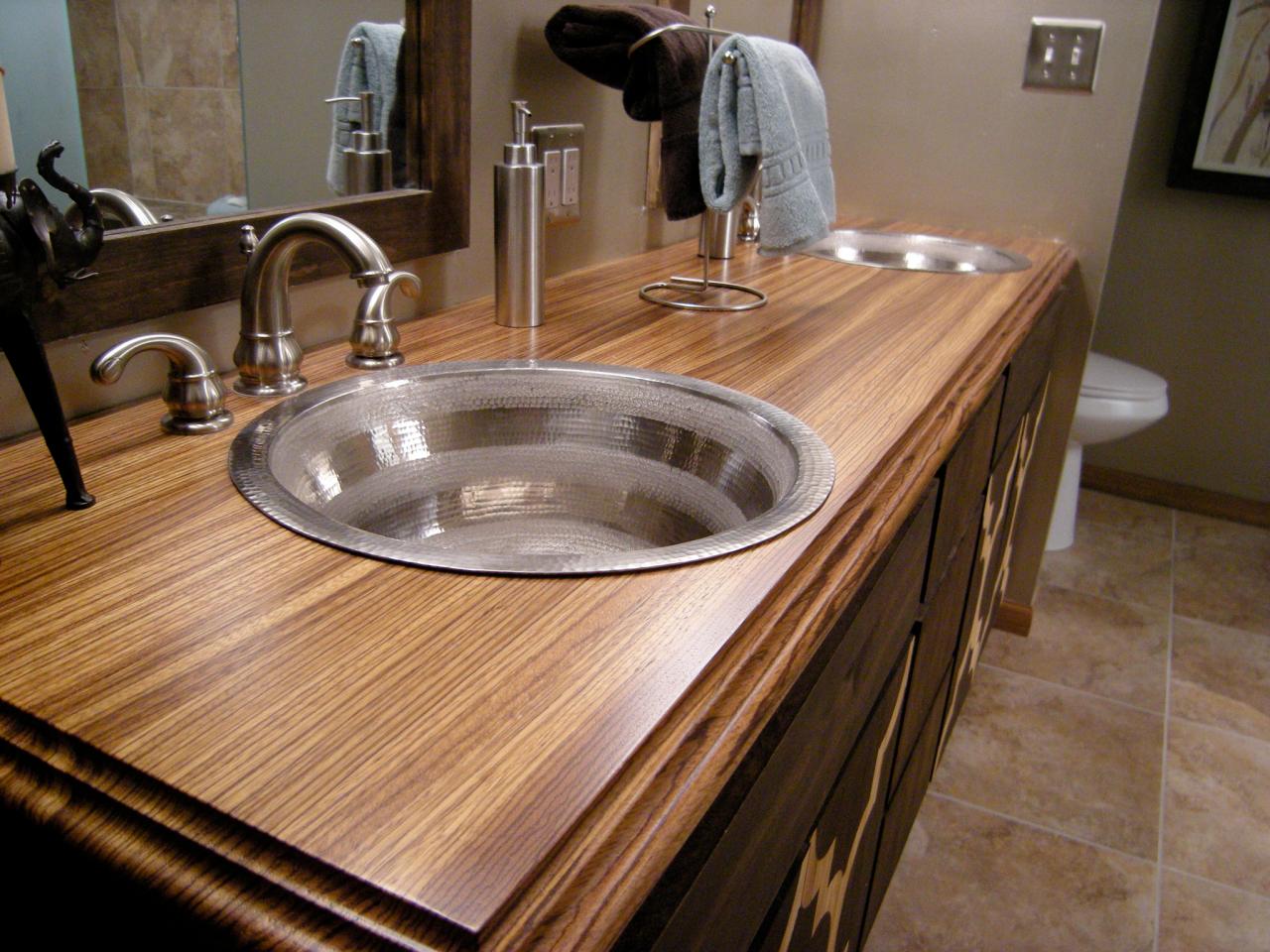
Bathroom Countertops Los Angeles Pacific Green Homes

Related articles: